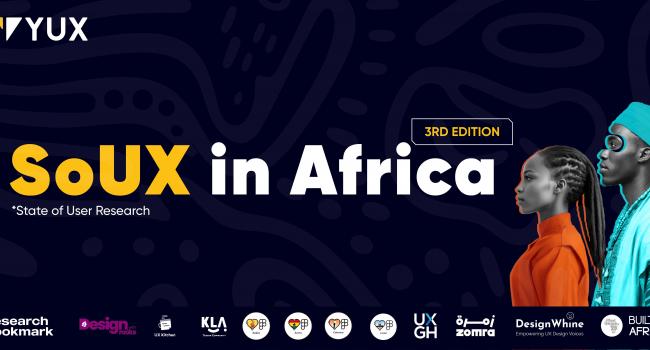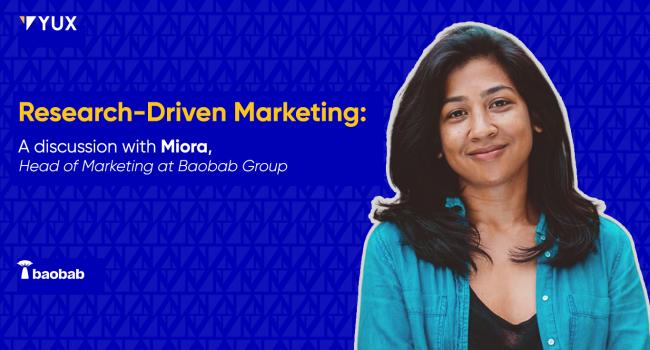Here is how it went down!
Over the last three years, I've navigated numerous 'first-time moments,' each initially uncomfortable but ultimately leaving me with a sense of pride. Each milestone, upon reflection, prompts an internal acknowledgment— "Deng, Sash! I (Sash) am actually proud of you (Sash) !- You are really living up to your God-given name , Oseadeyo which means one who says and does it to successful completion”
While my professional growth and experiences aren't solely propelled by my individual strength, the environment and professional space I find myself in as a Design Researcher at YUX Design play a significant role. I express immense gratitude for the opportunities and constant guidance and feedback I receive from my colleagues at work, recognizing their unique roles and molding my professional journey..
Among these notable moments (which I'll delve into in upcoming articles) was the experience of preparing and leading my first in-person focus group discussion. The emphasis on "IN PERSON" is intentional, as my professional activities predominantly unfold within the virtual realm, where phrases like "Can you hear me?" or "Oops, I'm on mute! I have been talking to myself" are commonplace in this remote working landscape.
In this context, in-person engagements take on a special significance for me. They provide an opportunity to step out of my comfort zone (which, truth be told, I cherish) and witness the tangible impact of my work as a design researcher whose focus is on influencing African society positively.
In this particular first moment of leading focus group discussions in Cape Coast and the Volta region in Ghana, I'd like to invite you into two of my thought processes as I prepared and executed these sessions.
Dressing the Part: Navigating Cultural Sensitivities in Field Research”
When preparing for in-person interviews or research activities, the first question that invariably surfaces in my mind is, "What is the first impression I want to give with the clothes I am wearing?" It's a multi-layered decision-making process:
- Do I want to be trusted, making people feel like I am one of them?
- Do I want them to know that I have "arrived" and they can trust my expertise?
- Do I want them to think I could be their child, sister, daughter, or even their momii (mummy)?
- Do I want them to see me as a local from within their community, a local from their country but from another community/group, or a foreigner?
My responses to these questions become the guiding principles for the subsequent set of inquiries:
- Given my body type, what would look good on me and make me feel comfortable?
- If, for some reason, we had to go into the house of God during the research setting, would I feel comfortable with what I am wearing? (Nothing like this has ever happened, though)
- Are there any colors I should not wear because in that community it means something else?
- Does the community have certain dressing standards that I can replicate? Do I need to purchase them? How much would this cost me? Do I have alternatives?
- Do I know of anyone who has firsthand experience within the location I am going to conduct research? Can they advise me on what is appropriate?
For this focus group discussion (FGD) in my home country, Ghana, I sought the expertise of my parents. My mum picked out my clothes for the Cape Coast (she is Akan, and has worked in Cape Coast before) focus group discussion, and my dad, being Voltarian, chose what I wore for the Volta region.
In a similar research endeavor in Uganda, specifically within refugee camps, I reached out to our local researcher, Agatha Nampera, for guidance on what to wear and what to avoid. Prior to this, I scoured the internet, watching YouTube videos to understand how people dress in refugee camps and how to strike the right balance.
And yes! at the end of the day this is what I wore! simple? maybe?
Although it may appear to be just a regular top and blouse or jeans trousers and a blouse, a lot of thought went into the selection. After all, that's what matters—diligence in the process, or maybe my overthinking mind kicking in! It made me feel more comfortable, knowing I had considered various factors. After all, I am a researcher!
Now, let's talk about my hair. I pondered whether it's best to scarf it or leave it uncovered. In Ghana, there are communities within different regions where women are “expected” to cover their heads, especially when entering the house of God. Although the research location was nowhere near a church, I wanted to be perceived as someone they could relate to—perhaps their older child or even a sister. So, after much contemplation, I settled on tying a scarf for the focus group in the Volta region.
At the end of the day, my intention behind all these thoughts was not to be seen as an "oversabi" (know-it-all) Accra girl who has come to the community with the office men and some white men to extract information. I wanted to be perceived as their child, their daughter, their sister fostering an environment where they felt super comfortable sharing openly with me, thus reducing research bias.
Tip: If you do not have the mental space to think about this when going into rural areas to conduct research, a simple jeans trousers / skirt and unbranded shirt should work fine.
Navigating Public Speaking in Twi and my Journey to Fluency
Growing up, my first language was Twi (language for Akan group in Ghana) , the language my mother communicated with me. At school, I would learn English and simultaneously translate it in my head to Twi to fully understand what was being said (truthfully, I still do this for certain situations because, to me, Twi holds more weight). I often wish I had been exposed to different Ghanaian languages like Ga, Hausa, or even Ewe to connect better with people from those ethnicities. Nonetheless, in Ghana, Twi is predominantly spoken, regardless of the ethnic group.
This focus group became a test of my conversational and public speaking skills in Twi. I had to explain the research process and activities to 40-70-year-old men and women that was very simple, straight to the point in a way that exuded respect. My only reference points in these moments were memories of Ghanaian movies of scenes in the palace , scouring my mind for words and mannerisms that portrayed my respect for the participants in the focus group discussion.
To show respect, I consistently addressed them by incorporating 'Maa,' 'Daa,' or 'Auntie' before their first names. For example, 'Maa Abena,' 'Daa Philip.' Honestly, regardless of the situation, I never call an elderly person by their first name unless explicitly told to do so— a cultural norm I follow without question because I really do not mind.
I discovered that while I excelled in holding extended conversations in Twi with 2-3 people (a necessity in Ghana), presenting in front of a larger audience in Twi led me to mix words with English (because this was my public speaking language). This wasn't due to a lack of confidence or understanding but rather a result of being unaccustomed to situational public speaking in Twi.
Upon reviewing the videos from the field, I believe I did a fairly good job. What do you think? Could I improve? Definitely 100% emoji. I am my own critic.
In the same way I practiced my public speaking in English, I recognized the need to build the muscle for public speaking in Twi.
Soooo, how am I approaching this challenge?
Well, currently I do sometimes read the Bible in Twi…. (and French and Pidgin English as well). Whenever the occasion arises for a Twi translation in church, I eagerly contribute.
After all, I cherish my language and take immense pride in being a full Akan babe!"
Managing Power Dynamics
Growing up, I was always told that "children are not allowed to participate in conversations with elders," or "you only speak when you are called upon, not vice versa." Yet here I was, facilitating a discussion on the challenges and experiences within the healthcare system, primarily with older individuals.
Throughout the conversation, I had to remind myself that I was the lead and needed to steer the discussion in the direction I desired. This was an internal struggle, confronting ingrained mindsets while still maintaining my position as the facilitator. Although outwardly I might have been perceived as the expert, I was constantly questioning if I had the “right” to be in this position.
During one encounter, an elderly gentleman who held an important role in the community shared some dismissive comments on the need for this conversation and how he felt we did not have the role, nor the time to be asking these questions.. Despite his authority, I maintained composure amidst my internal turmoil and calmly acknowledged his perspectives while resharing our objectives, the available time for the conversation and the opportunity for anyone who might have other activities to withdraw from the conversation at any time they felt it was necessary. I also made sure to re-assert why their views on this topic were very important, because at the end of the day, we are looking to improve on that particular topic within the healthcare system with and for them; therefore their participation was very essential.
In all these situations, my intention was to start with non-threatening energizers such as “what is your favorite food” and drawing similarities and differences with facilitating the session to lighten the mood. And other simple things like making the conscious effort to remember and use participants' names, drawing a diagram to help recall faces and details.

At the end of the sessions, our team received positive feedback, with participants appreciating the flow of the conversation and how we prioritized allowing everyone to share their opinions. One young lady even approached me with feedback and a question
“wow! I really like your voice and how you handled the conversation with Nana(the older gentleman). How did you get to do this work? Is this a man's job, because you are the only woman on the team? !
I took the time to explain to her the process of how I became involved in this field, emphasizing that gender does not limit one's opportunities in this field.
How did I feel?
Accomplished! I created the space for people to be heard. I brought smiles onto their faces, and even if it is just for that focus group moment, my time is well spent.



